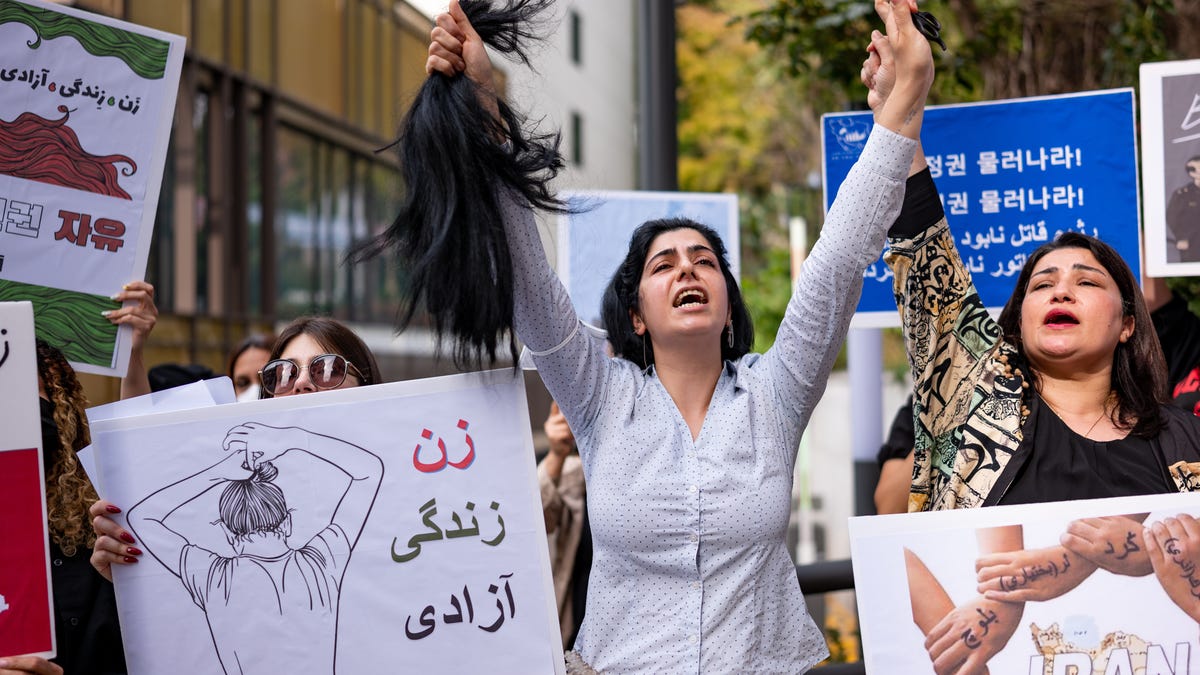VPN Demand Surges in Iran as Protests Continue, Study Shows
Fighting to overcome government censorship of Instagram and WhatsApp, Iranians are seeking out virtual private networks in overwhelming numbers.

A demonstrator in Seoul, South Korea, outside the Iranian embassy holds her hair cut in protest of the death of Mahsa Amini. Amini was detained in Iran by the morality police for not wearing her veil properly, and died in police custody.
Demand for virtual private network apps has skyrocketed over 3,000% in Iran, researchers said, following Iranian authorities' attempts to block in-country access to WhatsApp and Instagram on Sept. 21. The government's latest censorship efforts come in response to the surge of protests that have continued throughout the country over 22-year-old Mahsa Amini, who died in the custody of morality police in Iran.
Amini was initially detained Sept. 13 by Tehran morality police, who enforce the Islamic Republic's strict dress code, for allegedly wearing the mandatory Islamic headscarf too loosely. She died three days later after falling into a coma. Police said Amini suffered a heart attack, though family members said Amini had no history of a heart condition. Her father said later that Amini had bruises on her legs.
On Sept. 17, protests erupted in Saqez, Kurdistan -- Amini's hometown -- during her funeral, and have since continued across Iran and the globe. Iran's authorities have responded by restricting internet access to several websites and throttling speeds during certain hours. Thousands of websites are already banned in Iran, where censorship efforts have accelerated dramatically since 2016.
Independent researchers at Top10VPN measured a spike of more than 3,000% in demand for VPNs, which are routinely used to circumvent internet censorship efforts. Researchers measured the spike from Sept. 22 to Oct. 3.
A chart from researchers at Top10VPN shows daily VPN demand increases in Iran compared with the average daily demand for VPNs over the 28 days prior to Sept. 21, 2022.
"Demand for VPN services to circumvent the social media blocks rocketed by 2,164% on Sept. 22 compared to the 28 days prior. VPN demand rose further still in the following days, peaking at 3,082% higher than before the protests on Sept. 26," Top10VPN's head of research, Simon Migliano, said in an update this week.
Migliano said the average daily demand for VPN services has since remained very high following the recent peak, with demand now at 1,991% above the normal baseline.
Read more: Casual vs. Critical: When Your VPN Is a Matter of Life or Death, Here's How to Pick One
In a February report, Swiss provider ProtonVPN released the results of an 18-month analysis, finding a link between government internet censorship efforts and surges in its customer base across several countries in the same time period. The company said the largest surge in censorship-driven sign-ups originated in Azerbaijan and began in September 2020 when tensions started to resurface between Azerbaijan and Armenian forces.
"The country experienced a whopping 500-times increase in sign-ups from the end of September 2020 through October of that year before a huge drop in November when it has been reported that social media and other platforms were back online," ProtonVPN said in a Feb. 22 release.
The company said it saw similarly significant results in Senegal during the country's period of mass demonstrations last year. When Senegal authorities imposed internet and social media service blocks on Mar. 5, 2021, ProtonVPN service sign-ups rose 400 times more than average.

